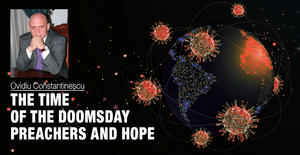The time of the doomsday preachers and hope
This is the time of the doomsday preachers, the moment when all the ones that predicted and preached the end of the world (as we know it) could stand proud in the middle of any empty square in any empty city and shout to the empty world 'I've told you so!'This is the time when The Evil One sacrificed the lust for grandeur on the efficiency altar, opting – in his battle with the Good - for a minuscule yet deadly virus rather than a magnificent and brilliant war. So far, the THING is doing its job with an infectious competence: almost 2 billion people around the world confined at home, in self-imposed house arrest, a quarter of a million people infected (as we write), 5% in serious condition, and 30,000 killed during the first 3 months of the confrontation. But what makes the fight with the Covid-19 different from the similar situations in history is that DEATH on medical grounds has become somehow unacceptable and we are valuing LIFE of the individual as high as never before.
Until now the Covid-19 pandemic looks pathetic in comparison with previous ones: (165 AD) Plague of Galen – 5 million people dead; (541 -542 AD) Plague of Justinian – 25 million people dead; (1346-1353 AD) the Black Death – anything from 75 to 200 million people; (1889- 1890 AD) the “Russian” Flu – one million dead; (1918 – 1920) the Spanish Influenza – 500 million people infected, up to 50 million dead, (1956-1958 AD )The Asian Flu – 2 million people dead; the HIV/AIDS pandemic - 25 million people dead (and still counting, with no vaccine in sight).
Yet, as pathetic as may it look from the number of the deaths’ point of view, the Covid-19 pandemic managed to literally shut down the world and bring the economy to a standstill in less than two months. No war ever has managed to do this. The THING has turned the economic world upside down and inside out: we are encouraged to stay at home, to work from home and away from the traditional “working place”, to keep “social distance” against the our natural instinct and so on. Some are even paid to stay at home and not turn to work.
The tiny THING that has killed over 30.000 people has shown how dependable we are on each other as individuals and as nations. We are in it together, we are from the same planet, no longer from one country or from a certain town. The traditional borders are no longer there even if politicians are clinging on them in a desperate attempt to hold on a certainty that in reality does not exist. The true meaning of the sentence that once we will wake up from this nightmare “the world will no longer be the same” is this: we are one. We may not have the faintest idea of what the world will look like at the end of the Covid-19 pandemic then but for certain we will prevail. There will be losses, it will costs and it will be hard, but we will prevail.
The bad news is that economy will take some time to get started and we are not talking months, but years. Many years. There are entire economic areas that have been affected: transportation, (aviation industry is all but flattened, with less than 70% flights than in December 2019, ground operation providers have followed suit); the hospitality industry (the hotels converted into quarantine centers and food outlets that cater for them do not really count); retail is gone; leisure, entertainment and sports have disappeared literally over the night alongside with restaurants, pubs and clubs; the automotive industry have closed down with millions of workers around the world sent home; agriculture is hit by lack of workforce (and drought in Romania, in particular); the energy sector hid by a 70% drop in demand (no more production no more electricity needed); the oil industry is in disarray following a nose-dive in demand, over-supply as a result of the confrontation between the Saudis and Russia has pushed the oil price down to the 20$/barrel boundary (and some insiders even contemplate a doom scenario of an unthinkable 5$/barrel as tens of large tankers filled with no-more-needed A1 jet fuel are sailing on the high seas as floating storage reservoirs). Given its current state this huge machine will not start at one turn of the key but by the help of the hand crank and a lot of effort.
There are, however, some good news too. The first one is that the younger generation has no problem with working together regardless the physical distance that separates them. After being pestered by their parents for playing games on line, the younger generation seem to be at ease in the e–classes all around the globe (“I’ve told you, dad that one day it may be useful”), that e-learning is not just a fancy word and the ability to find educational resources may be the hottest thing into the CV of a person that is looking for a bright career in education. The second good news is that employers from around the world have started to realize the value of the “working from home” which until now was another word for calling-in a sickie. By a twist of the fate, the massive contamination and subsequent death of first-line doctors will push hard on research on digital healthcare and the deployment of robots and AI during the next pandemic.
To end on a positive note, there is hope at the end of the tunnel, no matter how long that is.
This is also available in our print edition of Business Arena.
S-ar putea să îți placă:
COMENTARII:
Fii tu primul care comenteaza

